Gold and Silver: Who Gets Billions Allocated for Sports
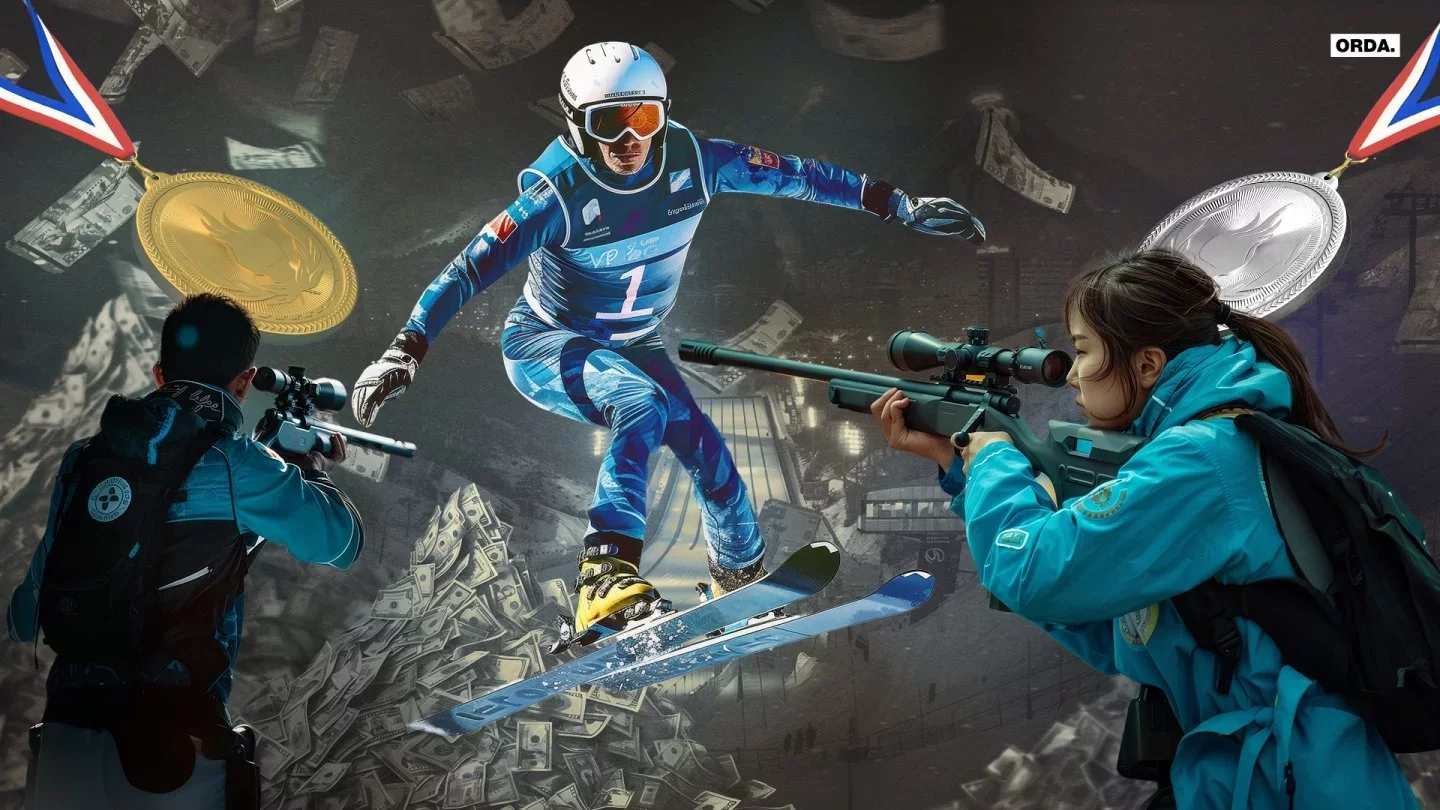
At the end of May, Antikor published the results of an analysis. The department analyzed The Ministry of Sports. Signs of corruption risks were found. An imbalance in sports financing and a lack of transparency in the distribution of funds are among the reasons for this. Orda.kz decided to look into multimillion-dollar contracts on the government procurement website.
Scandal after Scandal
Antikor’s interest in the Ministry of Sports is not random. Scandals shake the sports sector every few months. A more recent one involves the uniforms for the 2023 Asian Games participants. Athletes initially complained about their quality at the games. In the winter, it turned out they did so with good reason. The uniforms were bought at wholesale markets in China.
The deputy director of sports development was then arrested on suspicion of fraud. A few days later, its former head, Oralbay Zhaksymbetov, was arrested in a different case. He was arrested on suspicion of embezzling funds allocated for the Ural FC Akzhaiyk.
Corruption scandals in sports have recently been coming one after another:
- On May 31, Kalmukhamet Donsebayev, director of FC Jetisu, was arrested in Taldykorgan
- On June 4, Antikor reported that sports titles were illegally issued in Kazakhstan
- On June 6, the Almaty Sports Department and the Olympic Reserve Training Center employees were suspected of embezzling 56 million tenge.
The situation around the Olympic team's uniform is also peculiar. It took almost two months to select designs and hold two competitions. They ended up choosing options from organizations that are difficult to find, even on Google.
Meanwhile, Antikor provides the following figures in its analysis:
Since 2018, the budget of the sports industry has doubled and amounted to 1.4 trillion tenge. It is planned to allocate another 1.3 trillion tenge for the next three years.
But who received this money?
Service Rendered
We decided to calculate the money allocated for sports from the beginning of 2022. We initially examined the largest contracts that the Ministry of Sports concluded — ones starting at 100 million and higher. The main recipients of funds are also government organizations. The maximum amount went to the Sports Development Directorate (SDD) (more than 79 billion tenge for 2022–2024).
Other major recipients include:
- Olympic Training Center (OTC) "Astana" - more than 17 billion
- National Center for Sports Medicine and Rehabilitation - more than eight billion
- Olympic training center for winter sports - about five billion
- Hundreds more millions were allocated to sports educational institutions, anti-doping laboratories, etc.
This would seem relatively normal. The budget sponsors state sports organizations, as expected. Opacity, however, points to the contrary.
OTC "Astana" will serve as an example. In 2022, the center received 5.8 billion tenge from the Ministry of Sports, and in 2023 - 5.1 billion tenge. The service for which the department paid is “Preparation of Olympic Reserves for Summer Olympic Sports.” In both cases, the specific sports are described in some detail in the agreement's subject. Regarding 2022, no obligation to do so is indicated, but for 2023 there is.
Below is the certificate of work completed for September-October 2023. The service “Preparation of Olympic Reserves for Summer Olympic Sports” is listed as completed without details.
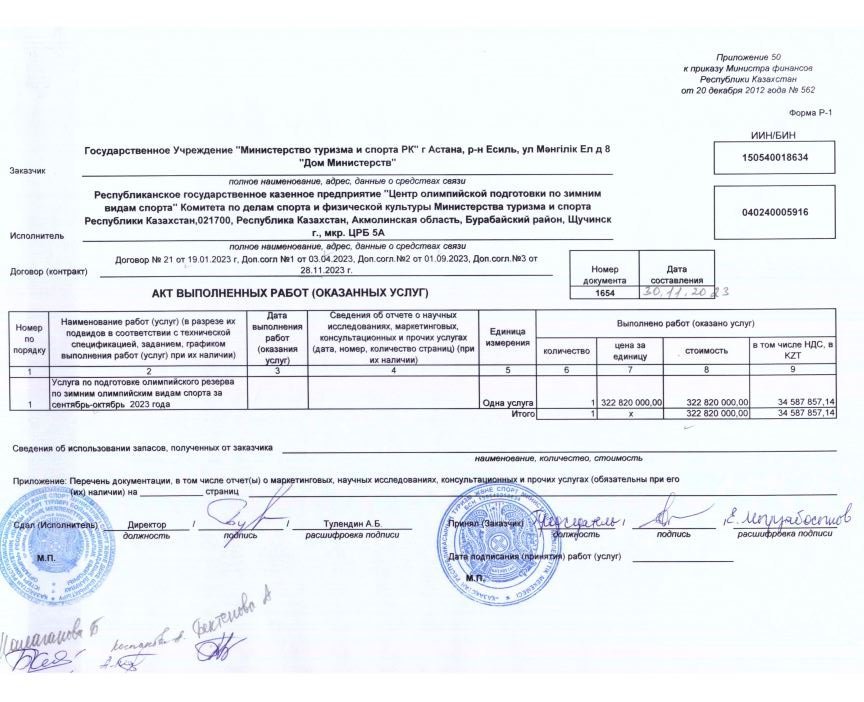 The list of adopted acts also lacks details. The document dated December 2023 contains the following table:
The list of adopted acts also lacks details. The document dated December 2023 contains the following table:
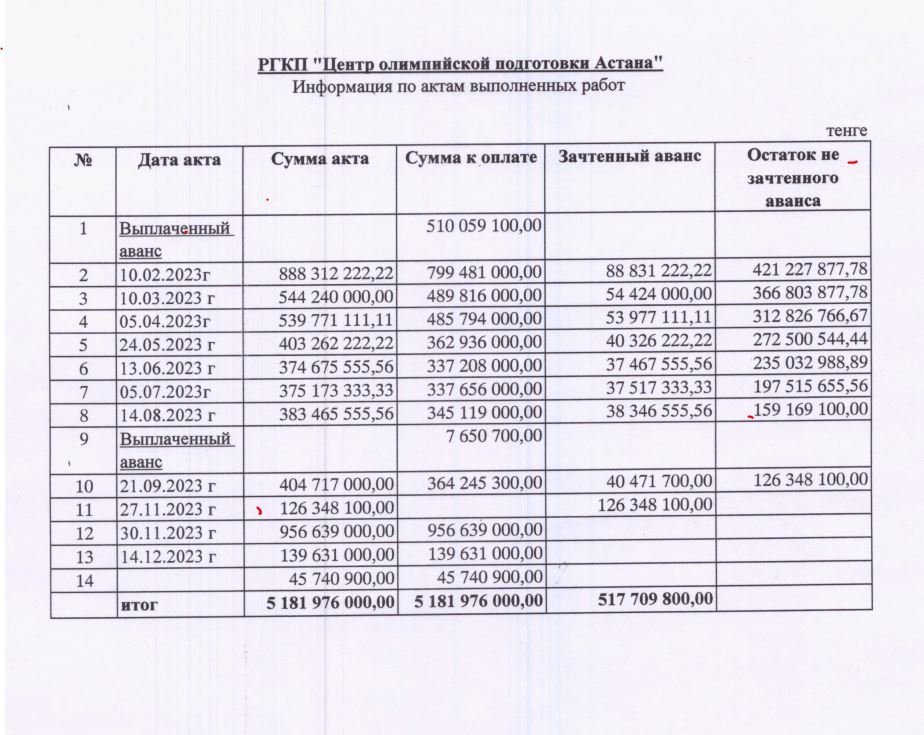
The acts of work completed look similar for other organizations. What athletes were trained, what competitions were they taken to, and what equipment did they buy? The acts signed by the Ministry of Sports contain no details. Most likely, this is the standard adopted by the department. Nonetheless, it emphasizes the opacity that Antikor was talking about.
It is indeed possible to scrutinize the government procurement of the Astana Center and other organizations on the same government services website. But this is no easy task for those who want to learn where the allocated money went. Be it an Antikor officer or an Orda journalist.
Regarding OTC “Astana”, in the state procurement register, everything is lumped together: the purchase of sports equipment, the maintenance of sports facilities, and the repair of floors. Is all of this for the preparation of the Olympic Reserve for Summer Olympic Sports?
Badges and Clubs
We have also studied the Sports Development Directorate's government procurement, the largest recipient of money.
As it turned out, SDD pays quite a bit for renting offices. In 2023, SDD paid more than 114 million tenge for renting an office in the capital’s Nur Tau business center — approximately 9.5 million per month. In 2024, rent became more expensive. More than 30 million has already been paid.
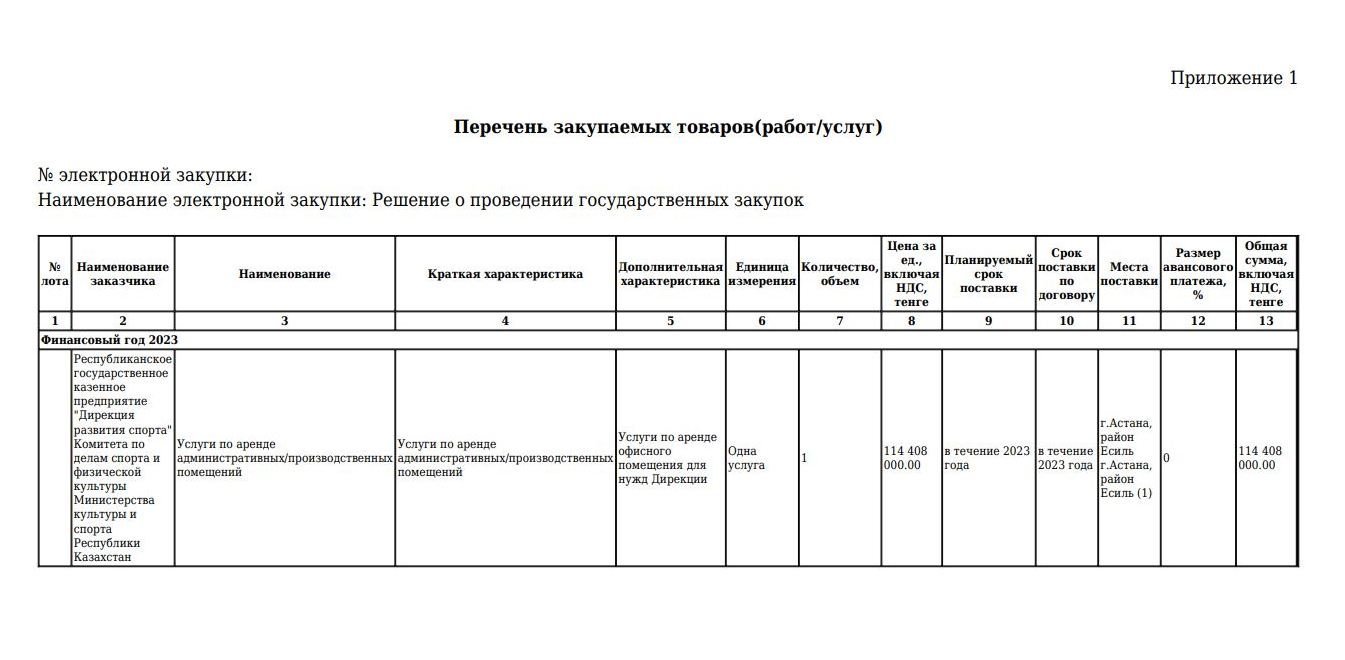
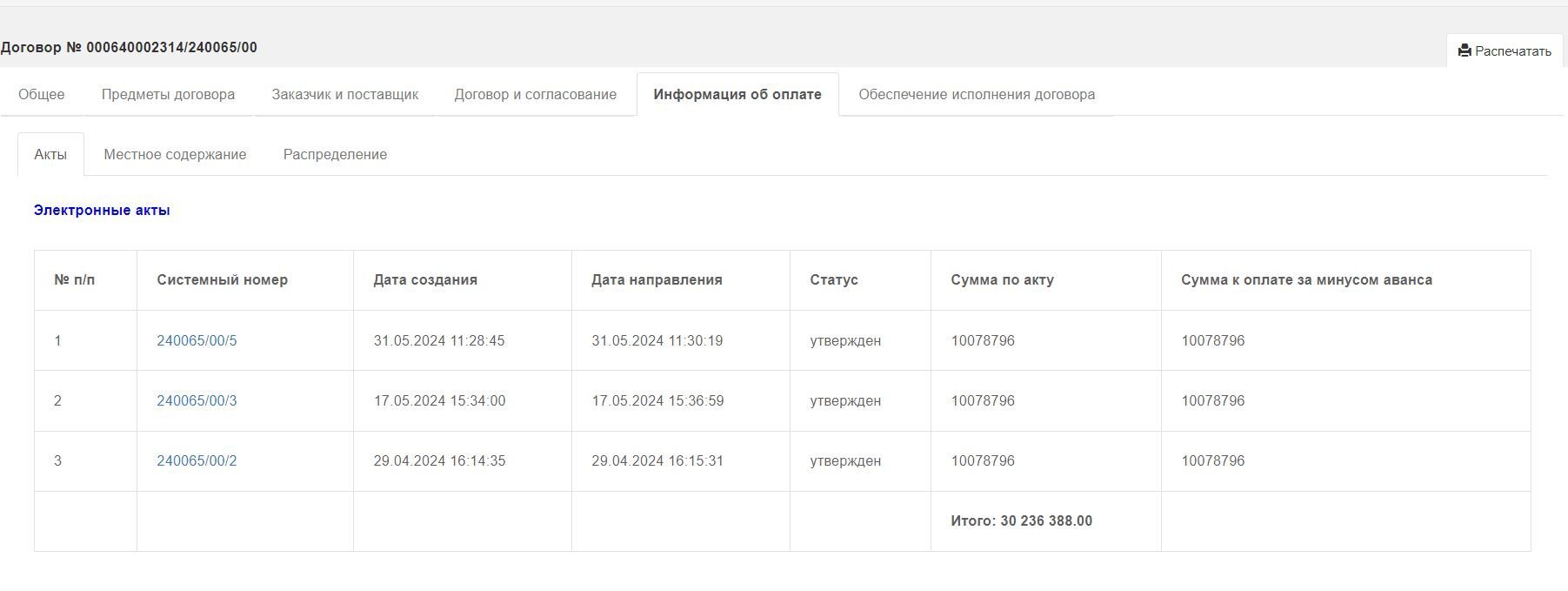
The SDD orders “Honorary Sportsman” badges from year to year. In 2022 and 2023, about nine million tenge were allocated for them, and in 2024, more than 10. The Kazakhstan Monentny Dvor was on the other end under a direct agreement for all three years. This year, SDD ordered 80 such badges for 135 thousand tenge apiece. Two years ago, the badges were 97 thousand tenge apiece.
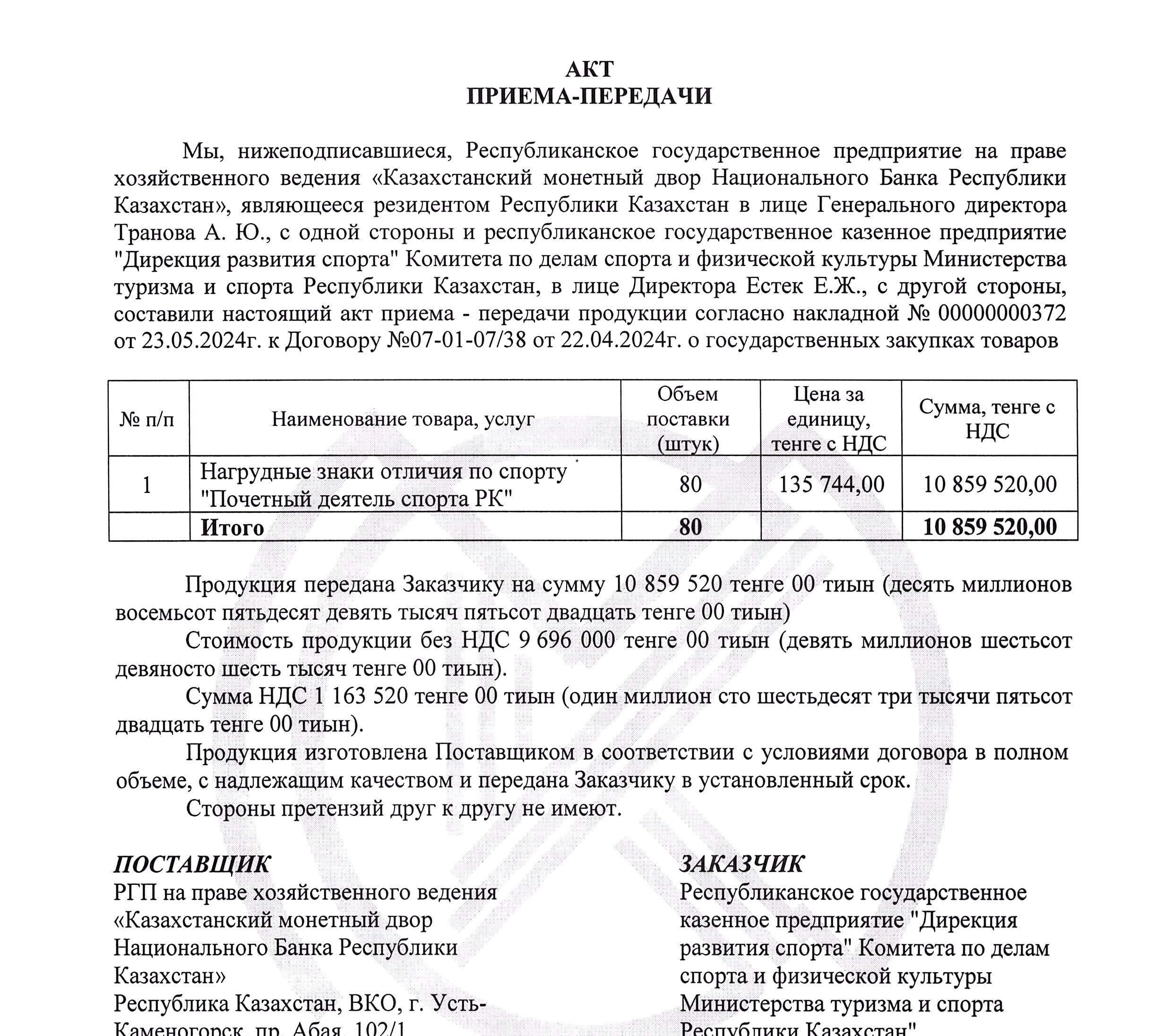
Direct contracts are also noteworthy. If we look at the SDD's purchase for 2022, about 2.2 billion were received under direct contracts by three organizations:
- "Spetssnab-2000" - 13 contracts for approximately 887 million tenge. Sports uniforms.
- Nurly Sapa KZ - 13 contracts for approximately 638 million. Mainly sports equipment.
- "Olympic-Shymkent" - 12 contracts for approximately 698 million. Sporting ammunition and shooting equipment.
"Olympic-Shymkent" and "Spetssnab-2000" are specialized organizations that supply sporting goods. Olympic-Shymkent specializes in target shooting.
According to open data, Nurly Sapa KZ purchases sports equipment, organizes cultural events, installs air conditioners, cleans blinds, and much more. It mainly operates in Shymkent.
But for some reason, SDD decided to conclude an agreement with it. These were direct contracts without competition. In December 2022, 1,000 ball hockey sticks were purchased from Nurly Sapa KZ for 100 million tenge.
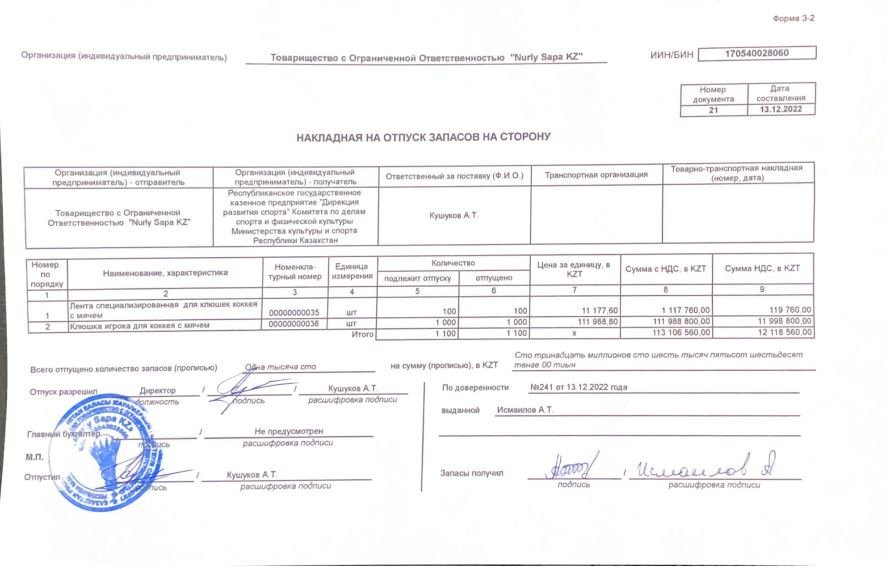
Fast forward to 2023, and here again, we see the “favorites” of the Sports Development Directorate. This time, there were two of them. The first is Zaura Kurumbaeva's individual entrepreneurship “79th Quarter”. It is engaged in tailoring.
It is classified as a small enterprise with up to 10 employees. 16 direct contracts were concluded for the supply of sportswear for national teams with it. The total amount of contracts exceeds 500 million tenge. The largest of them is the purchase of tracksuits worth more than 72 million.
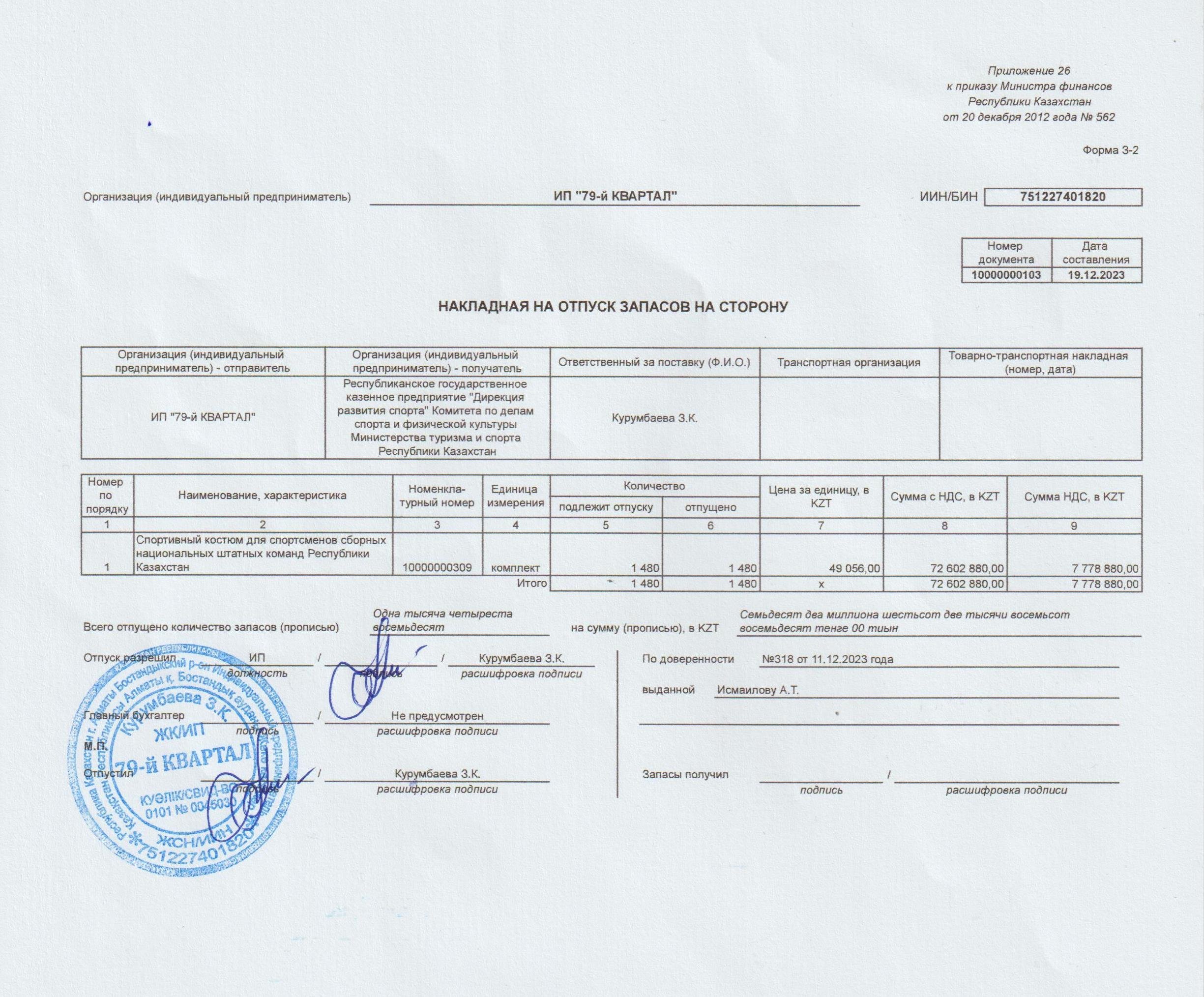
The second "favorite" is KazSpo-N LLP (“Kazakhstan modern professional clothing - New”). 17 contracts worth approximately 450 million tenge were concluded. One contract was worth 110 million. It was concluded for sports outfits (sports, training, windbreaker suits, polo shirts, T-shirts, shorts). These outfits were for teams that would later participate in the 19th Summer Asian Games, Hangzhou (PRC). These are the very uniforms that athletes later complained about.
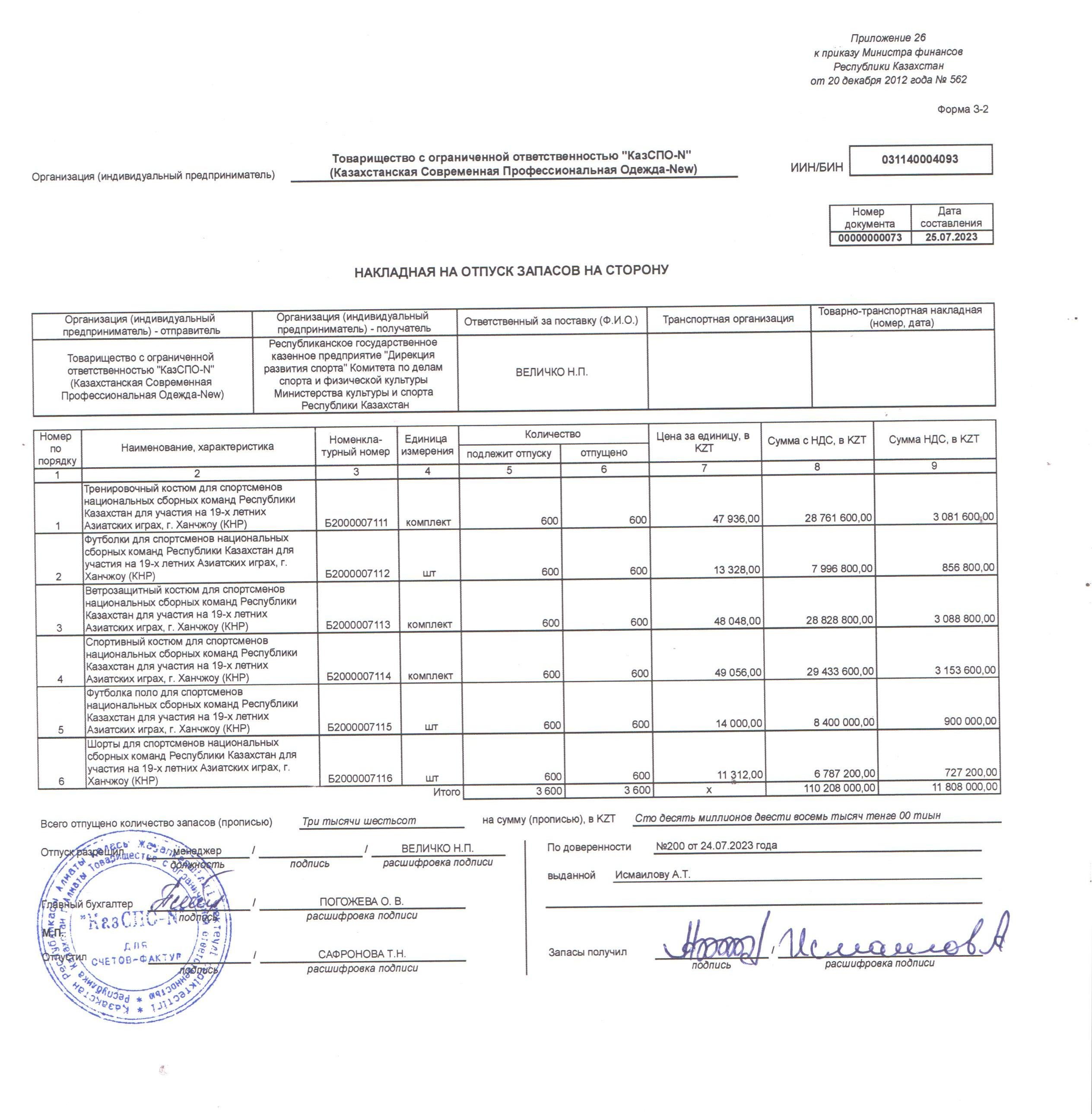 Other contracts relate to the supply of uniforms for participants in international sports competitions, including the Asian Games, the CIS Games, and the World Beach Games. Incidentally, Oralbay Zhaksymbetov is listed as the approver of the sporting outfit contract. He is currently involved in another criminal case, but questions may also arise regarding the sports uniforms.
Other contracts relate to the supply of uniforms for participants in international sports competitions, including the Asian Games, the CIS Games, and the World Beach Games. Incidentally, Oralbay Zhaksymbetov is listed as the approver of the sporting outfit contract. He is currently involved in another criminal case, but questions may also arise regarding the sports uniforms.
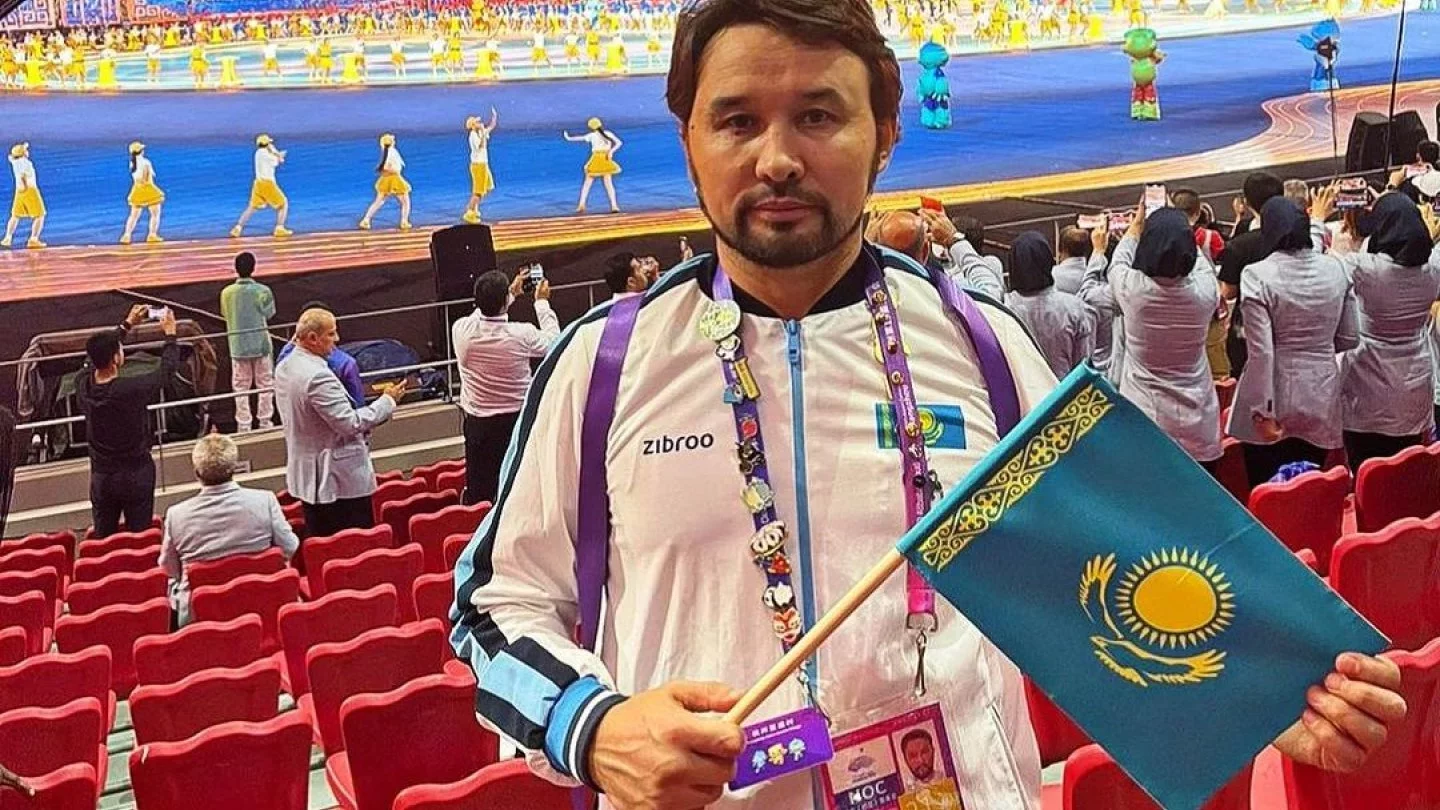
Meanwhile, the National Olympic Committee has announced that the Olympic team's uniform will be sewn with the help of sponsors and the efforts of the Spanish company, Joma.
Original Author: Igor Ulitin
DISCLAIMER: This is a translated piece. The text has been modified, the content is the same. Please refer to the original piece in Russian for accuracy.
Latest news
- Daulet Bekmanov Heads NIT Following Reported Data Leak
- Grave of Noble Nomadic Warrior Unearthed in Turkistan Region
- Kazakhstan Suspends Karachaganak Gas Plant Project With Foreign Partners
- Toqayev Opens CICA Headquarters, Highlights Importance of Diplomacy Amid Global Tensions
- Chinese Company Sinopec Launches 4.7 Billion Tenge Oil Drilling Project in Mangystau
- Ukraine's MoD Claims No Official Notice Received from U.S. on Munitions Suspension
- Azerbaijani Ministry of Science and Education Urges Caution Over Claims of Ending Russian-Language Education
- Alexander Lukashenko Pardons 16 People, Including Those Convicted of “Extremism”
- U.S. Reportedly Floated Corridor Deal via Armenia — Carnegie Report
- Orda.kz talks with Expert on Recent Escalations between Moscow and Baku
- Court Reviews Corruption Case Involving Samruq-Qazyna Subsidiary in Atyrau
- Claims Surface that Azerbaijan Plans to Close Russian-Language Schools
- Publishing House with Bomb Shelter Privatized in Almaty Returned to State Ownership
- 5,000 Dombra Players Set National Record in Taldykorgan
- A Piece of the Shoreline Pie: How Sarsenov Lost His Aqtau Land and Kulibayev’s Role
- Armenian Parliament Makes Initial Moves to Nationalize Electric Networks of Armenia
- Toqayev Orders Tighter Migration Control, Calls for Unified Digital Systems
- Kazakhstan: Forecasters Warn of Heavy Rains in the North, Scorching Heat in the South
- Who Writes the Rules? Trump’s Former Associate Discusses Kazakhstan’s Current Position with Orda.kz
- Omsk Governor Proposes Boosting Trade with Kazakhstan via Irtysh River

